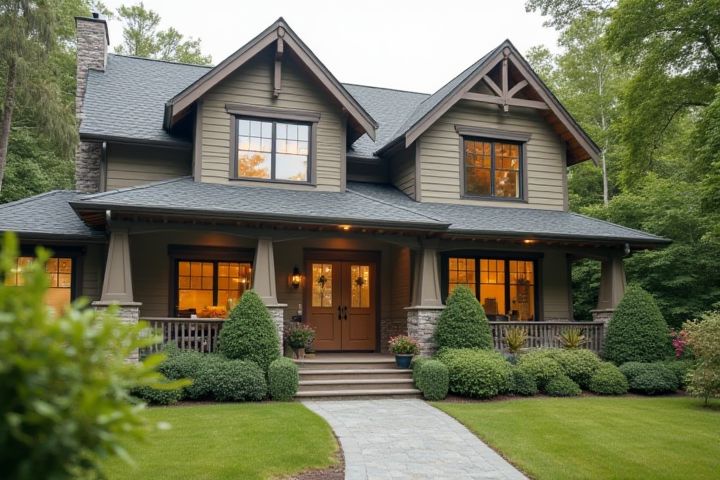
Investing in an energy-efficient house significantly reduces your monthly utility bills, contributing to long-term savings. These homes utilize advanced materials and technologies, such as high-performance insulation and energy-efficient windows, which minimize heat loss and enhance comfort. Additionally, many energy-efficient homes are equipped with renewable energy systems, like solar panels, further decreasing reliance on traditional power sources. The market value of energy-efficient properties tends to appreciate faster, making it a smart financial decision as you benefit from potential resale profits. You also contribute to environmental sustainability by reducing your carbon footprint and promoting the use of clean energy resources.
Why Invest In An Energy-Efficient House
Lower utility bills
Investing in an energy-efficient house significantly reduces your utility bills by minimizing energy consumption through advanced insulation, energy-efficient appliances, and sustainable heating and cooling systems. With lower monthly expenses, you can allocate more finances towards savings or other priorities, enhancing your overall financial wellbeing. Moreover, energy-efficient homes often qualify for tax incentives and rebates, further lowering your costs. By making this investment, you not only improve your personal finances but also contribute to environmental sustainability through reduced energy demand and greenhouse gas emissions.
Reduced carbon footprint
Investing in an energy-efficient house significantly reduces your carbon footprint, contributing to a more sustainable environment. Energy-efficient homes utilize advanced insulation, low-emissivity windows, and energy-efficient appliances, which can decrease energy consumption by up to 30%. By minimizing reliance on fossil fuels for heating and cooling, an energy-efficient house can lower greenhouse gas emissions, thus combating climate change. This eco-friendly approach not only benefits the planet but may also enhance your property's long-term value, making it a wise investment for both your finances and the environment.
Enhanced home value
Investing in an energy-efficient house can significantly enhance your home value, with properties showcasing sustainable features appreciating by up to 10% compared to traditional homes. These features, such as energy-efficient windows, insulation, and solar panels, not only lower utility bills but also appeal to environmentally-conscious buyers. In many regions, homes with high energy performance ratings often sell faster and attract higher offers, reflecting the growing market demand for sustainability. By prioritizing energy efficiency, you can ensure that your investment remains competitive and desirable in the ever-evolving real estate landscape.
Improved indoor comfort
Investing in an energy-efficient house significantly enhances indoor comfort by maintaining consistent temperatures and reducing drafts. These homes utilize superior insulation materials and advanced window technologies, allowing for better temperature regulation throughout the year. With features such as programmable thermostats, you can optimize heating and cooling, leading to more enjoyable living spaces and lower energy bills. Studies show that energy-efficient homes can reduce energy consumption by up to 30%, providing not only comfort but also financial savings over time.
Attractive financing options
Investing in an energy-efficient house not only lowers utility bills but also opens doors to attractive financing options. Many lenders offer special loans with lower interest rates specifically for energy-efficient homes, making your investment more affordable. You may qualify for government incentives or tax credits that can further enhance your financial benefits. With these favorable terms, your journey toward sustainable living becomes even more appealing and financially sound.
Government incentives
Government incentives for energy-efficient houses include tax credits, rebates, and low-interest loans, aimed at reducing the initial investment costs. For instance, federal tax credits can cover up to 30% of the costs associated with solar panel installations or energy-efficient upgrades. Many states offer additional rebates that can amount to several thousand dollars, making it financially attractive to enhance your property's efficiency. By investing in an energy-efficient home, you not only lower your utility bills but also position yourself to benefit from these substantial financial incentives.
Future energy cost protection
Investing in an energy-efficient house can significantly shield you from rising energy costs in the future. Studies indicate that energy-efficient homes can reduce utility bills by 20% to 30%, translating to substantial savings over time. With energy prices projected to increase annually by approximately 2-3%, your long-term investment becomes increasingly valuable. Furthermore, energy-efficient features, such as high-quality insulation and energy-efficient appliances, not only enhance comfort but also increase your home's resale value by as much as 15%.
Healthier living environment
Investing in an energy-efficient house promotes a healthier living environment by significantly improving indoor air quality. Features such as advanced ventilation systems and non-toxic building materials reduce allergens and pollutants, contributing to better respiratory health. Enhanced insulation and energy-efficient appliances minimize moisture buildup, which helps prevent mold growth, a common trigger for health issues. By prioritizing sustainability and health in your home investment, you create a space that not only conserves energy but also supports the well-being of you and your family.
Better marketability
Investing in an energy-efficient house significantly enhances marketability, appealing to a growing demographic of environmentally-conscious buyers. Properties featuring Energy Star certifications can see an increase in resale value, often ranging from 5% to 15% over conventional homes. These houses typically incur lower utility bills, potentially saving homeowners an average of $1,000 annually, making them a more attractive option. As energy efficiency becomes a priority, homes with sustainable features are likely to sell faster and retain higher demand in the real estate market.
Sustainable living benefits
Investing in an energy-efficient house significantly reduces your carbon footprint, promoting sustainable living by minimizing greenhouse gas emissions. Studies indicate that homes designed with energy efficiency in mind can lower energy consumption by up to 30%, translating to immediate savings on utility bills. These homes often feature advanced insulation, energy-efficient appliances, and renewable energy systems like solar panels, enhancing overall sustainability. Furthermore, the long-term benefits include increased property value and resilience against fluctuating energy prices, making it a savvy investment for the future.
